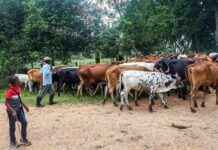Angolan President Condemns M23/RDF Occupation in Eastern DRC
Angolan President João Lourenço has denounced the resumption of actions by the March 23 Movement (M23), marked by the “illegal occupation” of Sake and Minova in the eastern Democratic Republic of the Congo. This dangerous escalation of conflict has raised deep concerns, especially in the North and South Kivu provinces, according to Lourenço, who serves as the peace process facilitator in the Great Lakes region.
Humanitarian Crisis Intensifies
The renewed violence has led to a dramatic deterioration in humanitarian conditions, with hundreds of thousands of people displaced, particularly around Goma, where infrastructure struggles to cope. The capture of Minova, a strategic town in South Kivu, and Sake, located 23 km from Goma, has heightened tensions, prompting mass exodus of populations.
Call for Non-Military Solution
Lourenço emphasizes that the conflict in eastern DRC cannot be resolved through military means. He urges all parties to immediately resume negotiations to prevent further escalation. The Angolan President stresses the importance of respecting the DRC’s territorial integrity and ending support for armed groups.
International Support and Criticism
The DRC has requested an emergency public meeting of the UN Security Council to address the crisis. Thérèse Kayikwamba, the Congolese Minister of Foreign Affairs, currently in New York, criticizes the Council’s inaction in the face of what she calls the “internationalization of the conflict” due to alleged Rwandan support for the M23.
Regional Verification Mechanism Impeded
The Enhanced Ad Hoc Verification Mechanism (MVA-R), established as part of the Luanda process to monitor ceasefire compliance, is facing significant obstacles. Kinshasa accuses Kigali of not fully cooperating, hindering progress in de-escalating tensions.
As we process the complex political dynamics and humanitarian crisis unfolding in the DRC, it’s crucial to remember the human faces behind the headlines. Imagine the families forced to flee their homes, the children deprived of education, and the elderly struggling to access medical care amidst the chaos. Each statistic represents a life disrupted, a dream deferred, and a future uncertain.
In times of conflict and crisis, the international community must prioritize dialogue, diplomacy, and genuine efforts towards peace. Let’s reflect on how we can support initiatives that promote stability, protect civilians, and uphold the rights of all individuals affected by conflict. Through collective action and unwavering commitment to peacebuilding, we can strive towards a more peaceful and secure world for generations to come.

















